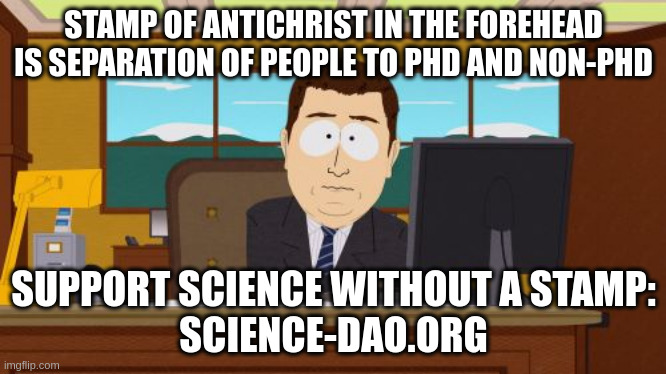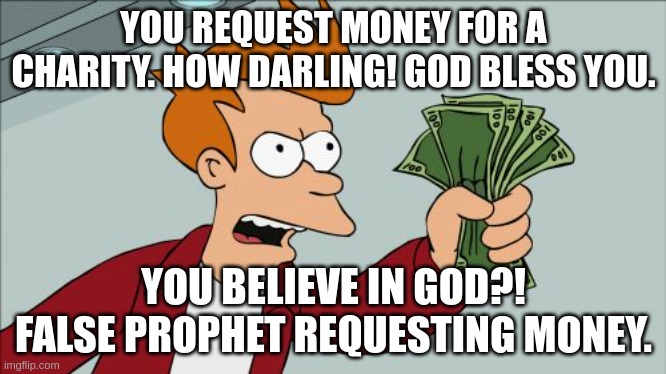|
Getting your Trinity Audio player ready...
|
Real Christians do good. As Martin Luther understood, Christians do good not for receive salvation in heaven, but reversely do good, because they are already saved. Salvation makes saved people do good.
Because Christians have freedom of choice, a Christian should choose the greatest good they can do and do it. (This is called “effective altruism“.) If you don’t choose the greatest good you can, you don’t oriented on good deeds. You may be driven by sympathy, empathy, pity, but not love in the biblical sense of this word: (Mat. 5) “46 For if ye love them which love you, what reward have ye? do not even the publicans the same? 47 And if ye salute your brethren only, what do ye more than others? do not even the publicans so? 48 Be ye therefore perfect, even as your Father which is in heaven is perfect.”

The biggest good deeds are often made by scientists. So, Christians must donate for science.

But which kind of science? The world science system is broken, it is against Christian values. In the Revelation of John there is spoken about a stamp on the forehead and the right hand. It is a certification of the hand skills (right hand) and forehead (where human thought skills are located). Thus Christians must not support the worldly system of science.
Considers the analogy: The worldly system is Hitler. If you lived in Germany and did nothing, you were considered as a supported of Hitler and bombarded mercilessly. You would be not considered as a supporter of Hitler if you actively resist. In the same way, God requires you to actively resist the worldly system of science.
To resist the worldly system, donate for AIIS software. You need to get rid of collaboration with the worldly science system by actively participating in doing good.
Real Christians do good, not as a way to earn salvation, but as a natural expression of the salvation they have already received. This truth was powerfully emphasized by Martin Luther during the Reformation. Luther understood that no human effort, ritual, or “good work” could ever be enough to secure eternal life. Salvation is entirely a gift of God’s grace through faith in Jesus Christ. Once a person accepts this gift and is made right with God, their life begins to change from the inside out.
Introduction to Salvation and Good Deeds
Salvation in Christian doctrine is by faith alone — it is God’s gift, not something we earn by our works. Yet faith that saves doesn’t remain idle. This article argues that faith may exist in a kind of quantum entangled state: present but undecided until activated in deed. Only when faith is exercised — through good works — is it “measured,” realized, and given form. Thus, while we are saved by faith, our deeds are the visible decision of that faith. Christians are therefore called to materialize their salvation — to make their faith real — through tangible acts, including donating for science.
Salvation, Faith, and the Quantum Metaphor
- Faith as an entangled quantum state
- Think of faith as an uncertain particle in quantum physics: entangled, alive, but not yet collapsed into action.
- Until faith is “used” — until we act on it — it remains potential. Deeds are the measurement that collapses faith into reality.
- That doesn’t undermine salvation by faith; it clarifies that genuine faith will manifest itself in visible fruit.
- Salvation by faith alone, but decided in service
- Scriptures like Ephesians 2:8–9 teach that salvation is a free gift of God through faith, not by works.
- But James 2:14–26 insists that faith without works is dead. A faith that never acts is an incomplete picture.
- Good deeds don’t create salvation — they reveal it, affirm it, and bring it into the material realm.
Why Donation to Science Aligns with Christian Life

- Doing the greatest good
- Freedom in Christ means choosing the greatest good with our resources, time, and energy.
- Supporting science—especially projects that serve humanity—can be among the highest expressions of love because knowledge and innovation benefit many.
- Justice, mercy, and the small
- The Bible repeatedly charges believers to care for the weak, uplift the overlooked, and direct aid to those who lack voice and resources.
- In science, this means funding early-stage research, underfunded scholars, marginalized disciplines — the “small” that often get neglected but may spark great breakthroughs.
- True Christians support fairness and justice, see here about the greatest injustice in the world in 2025.
- Warning against spiritual deadness
- Scripture warns that the unjust will not inherit the kingdom (1 Corinthians 6; Galatians 5).
- Faith that never aids others, never manifests, shows signs of being spiritually inert. Our deeds are not the basis of salvation, but they are evidence.
How Christians Should Donate
- Choose wisely: Look for science efforts that align with Christian values—truth, justice, compassion.
- Support the “small”: Grant funding, scholarships, grassroots science projects matter.
- Be consistent: Regular giving, not just occasional bursts, shows faith in motion.
- Give cheerfully: Our donations are acts of worship and obedience—not driven by guilt, but by gratitude.
Call to Action — Materialize Your Salvation
If you believe (in faith) that Christ has saved you, let that faith be made real through your deeds. Donate today to science projects and organizations that are trustworthy and aligned with Christian principles. Let your faith be more than words—let it be manifested in love, justice, and generosity.

Together, we can ensure that faith is not only professed but decided—collapsed from potential into impact. Your donation is one way to show that you are among those whose faith is active, visible, and deeply rooted in the reality of God’s grace.
Conclusion
Salvation remains by faith alone, but faith is not alone. It becomes decided, visible, and life-changing only through action. In supporting science and blessing the least among us, Christians do more than express gratitude—they materialize salvation. Let’s embrace this calling in 2025: to translate our faith into deeds that honor God, help others, and leave a positive mark on the world.
Ads:
| Description | Action |
|---|---|
|
A Brief History of Time
A landmark volume in science writing exploring cosmology, black holes, and the nature of the universe in accessible language. |
Check Price |
|
Astrophysics for People in a Hurry
Tyson brings the universe down to Earth clearly, with wit and charm, in chapters you can read anytime, anywhere. |
Check Price |
|
Raspberry Pi Starter Kits
Inexpensive computers designed to promote basic computer science education. Buying kits supports this ecosystem. |
View Options |
|
Free as in Freedom: Richard Stallman's Crusade
A detailed history of the free software movement, essential reading for understanding the philosophy behind open source. |
Check Price |
As an Amazon Associate I earn from qualifying purchases resulting from links on this page.


2 thoughts on “Why and How Must Christians Donate for Science in 2025?”